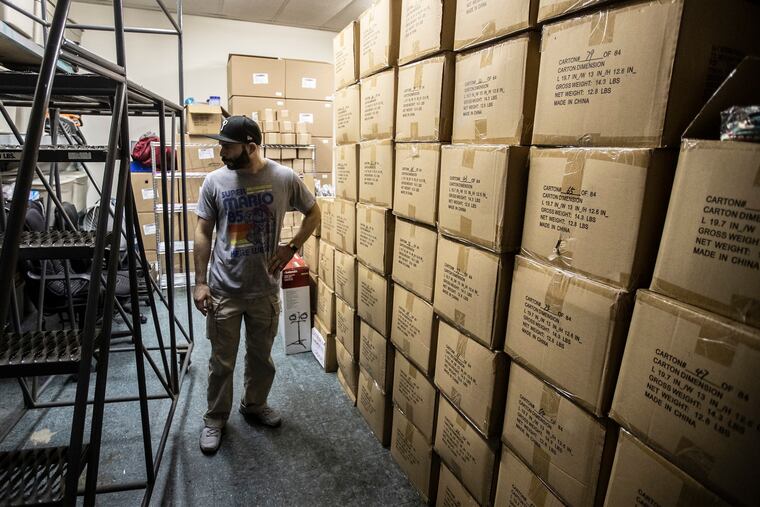Remember the Bucks County guy with the $1.6 million sales tax bill? Here’s how to avoid that
The best way to avoid this nightmare is to outsource this administrative headache to a professional. Or get a good sales tax software system for your business.

You may have read about Brian Freifelder, a 36-year-old Bensalem small-business owner who received a notice from the State of California that he could owe as much as $1.6 million for uncollected sales taxes from sales of clothing, shoes and groceries his online business made during the first six months this year through Amazon.
The sales tax bill is part of a more aggressive effort by states such as California to collect money they say is due to them from merchants – big and small - who sold goods warehoused in their state to residents of their state. Unfortunately, Amazon merchants who use the e-commerce company’s fulfillment services aren’t always told where their products are stored. But that doesn’t matter to many state authorities who are stepping up their efforts to collect.
“These guys are shipping goods off to Amazon," Paul Rafelson, a tax lawyer, told The Inquirer. "Amazon moves them all around, doesn’t tell them, doesn’t warn them, the State of California doesn’t even warn them, and then years later they’re stuck in this interstate commerce speed trap.”
Although the move by California is controversial (and to some legally questionable), the issue still remains: What can small merchants do to protect themselves in an environment where so many cash-starved localities are going after every opportunity for additional revenues?
At the very least, you need to fully understand your company’s "nexus." That's the term that describes whether or not you're liable to collect sales tax in a state or locality. Nexus defines the level of connection between a taxing jurisdiction and your business. You're generally considered to have nexus in a state (or any local jurisdiction) when you ship a product from inside that jurisdiction to a customer who is also inside that jurisdiction - even if it's just drop shipped from, say, an Amazon warehouse.
If this is the case, then you’re on the hook to collect and, thanks to a recent U.S. Supreme Court decision, many states like California can go after you retroactively if you’re not doing so. If you’ve got nexus, you’ve got to take action.
No, you’re not exactly liable for sales (and consumer use) tax in that jurisdiction. It’s generally a tax that your customers should be paying, particularly if they’re the last buyer of your product and your customer isn’t reselling or using your product in another product. As mentioned above, your job is to collect the tax where it’s due and then remit it. If you believe that there’s even a small chance that you have nexus in a state, then it’s on you to register with that state’s department of revenue (a handy list is here) and then start collecting those taxes by adding a charge on your invoice. If you think you’re exempt, however, then make sure to get a certificate from the state.
Are there any ways to avoid this? Not really. You can keep an eye out for the occasional sales tax “holidays” that states offer and push promotions around those days. But in the end, the best way to avoid Freifelder’s current nightmare is to outsource this administrative headache to a professional.
Finding one isn’t as easy as you may think. Because of the nuances involved with all of the local jurisdictions that charge sales tax, it’s hard for many accountants, unless they work at some of the largest firms, to keep up with all the rules. Googling for boutique firms that specialize in sales tax filings is one option, although because of their specialty, their costs will likely be higher.
For me, the best option is to rely on a good sales tax software system for your business.
Amazon and other online marketplaces provide tools to help. So do such companies as King of Prussia-based Vertex Inc. which offers applications that helps their clients identify and manage sales tax liabilities, collections and remittances in more than 11,000 taxing jurisdictions across the country. Their software – like competing cloud based solutions offered by Avalara and TaxJar -- connects to accounting systems, e-commerce platforms and online marketplaces such as Amazon and eBay to make the process more palatable for even the smallest of companies. These applications handle all the required filings, remittance and reporting obligations.
Why outsource? Because I bet, like many of my clients, you don’t have the time, knowledge or even patience to deal with these headaches. Yes, the necessary software and tools are an added cost to your company (Amazon, for example, charges 2.9% of all sales and use taxes and other transaction-based charges they calculate - Vertex and the others mentioned above don’t disclose their pricing). But doing this stuff in-house is likely much more expensive in the long run.
Let’s face it: The sales tax environment is getting more complicated every day and neither you or I is an expert in this area and we certainly don’t have the time to be one. Some of my clients like to take their chances and ignore these rules. For me, that game of tax-audit-roulette is risky and potentially very, very costly. If you don’t believe me, just ask Freifelder.